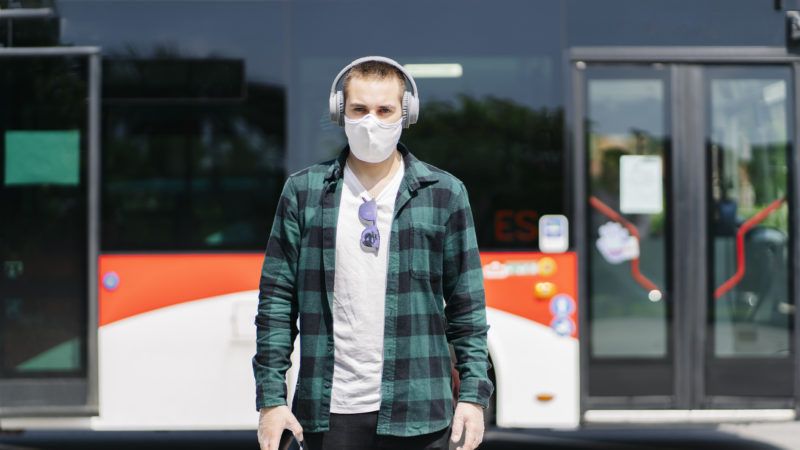It's Not Just Face Masks. Everything Is Now a Political Death Match.
An "oil spill" of politics has polluted American life, leaving little room for common ground.

Somehow, it became a sign of bedrock conservative principles to refuse to wear a face mask anytime, anyplace, in the middle of a pandemic. Likewise, it's now a marker of devout progressivism to shriek like banshees at anybody who fails to don a mask even for a stroll along a deserted path. Forget health concerns—masks have become signifiers of tribal affiliation.
The politicization of face masks is stupid enough, but research suggests that polarization in the United States has permeated many seemingly unrelated issues, leaving little of life unpolluted by partisanship. Those few who remain outside the scrum may have to bear heavy burdens in the days to come.
"What if polarization is less like a fence getting taller over time and more like an oil spill that spreads from its source to gradually taint more and more previously 'apolitical' attitudes, opinions, and preferences?" writes Pennsylvania State University's Daniel DellaPosta in an study published last month in American Sociological Review.
DellaPosta has been on this beat for a while, co-authoring a 2015 study finding that "as people congregate with the like-minded, they reinforce their shared views, "producing a stereotypical world of 'latte liberals' and 'bird-hunting conservatives.'" That earlier work helped explain the dynamic by which Americans sorting themselves by lifestyle choices that tend to correlate with politics—rural homes for conservatives and urban dwellings for liberals, for example—tend to become more ideologically representative of their chosen communities.
The new study explores evidence that "many initially apolitical lifestyle characteristics, from musical taste to belief in astrology, can become politicized as signals for deeper beliefs and preferences."
For his data, DellaPosta crunched data from the General Social Survey, which is overseen by the University of Chicago and has been compiling information about Americans' opinions since 1972. He found growing evidence not only that Americans are increasingly at odds with one another, but that they've chosen partisan sides over things that have no obvious political content.
Some connections seem to accrete almost accidentally, so that sports and beverage preferences become political signifiers.
"You may have heard politicians referring to 'latte-drinking liberals,' for example, which captures the idea of the oil spill," DellaPosta told Penn State News. "Why should something like drinking a latte become associated with your political ideology?"
The connections may start off as loosely linked lifestyle choices, but they become firmer as people come to associate a preference with a tribal choice shared by other fans of that preference. They then adopt a host of new preferences as symbols of their tribal affiliation.
"If every time I go to a football game, I see parking lots full of cars with Trump bumperstickers, I will tend to see football fandom as being associated with Trump support. If I already like football but do not yet support Trump, I might conclude from this that I should naturally support Trump due to my other preferences," writes DellaPosta.
By the same token, he adds, "once I come around to drinking lattes through this practice's association with liberalism, I might also proceed to adopt a series of other beliefs and practices associated with latte-drinking—such as driving a hybrid electric car or listening to indie rock."
That is, many people—enough to mold much of our society—tend not to pick and choose their beliefs through careful consideration, but to purchase the package deal. Their weekend plans come with a party affiliation, and that party affiliation pushes them towards dinner preferences.
And that's how we got to the point where "wearing a mask is for smug liberals. Refusing to is for reckless Republicans," as Politico noted. "Prominent people who don't wear them are shamed and dragged on Twitter by lefty accounts. On the right, where the mask is often seen as the symbol of a purported overreaction to the coronavirus, mask promotion is a target of ridicule."
The call-outs happen even when those with naked faces are far away from the risks associated with crowds, or when those donning them are in busy indoor spaces where viral transmission is a real concern. Forget about the risks or lack thereof of infection; it might as well be an argument over MAGA caps vs. pussy hats.
As you might guess, it's not a good thing when politics ooze across the landscape like an oil spill to pollute music choices, restaurant preferences, recreational activities, and sports fandom. This leaves a declining number of activities in which people can engage that don't carry partisan baggage.
"Cross-cutting cleavages have collapsed to form more encompassing partisan identities with little common ground between them," notes DellaPosta. "The existence of polarized 'super-identities' feeds affective polarization by leading people to simplify the outgroup (e.g., as an evil force unworthy of civil engagement) and attach negative stereotypes."
Experiments with exposing people to different viewpoints and activities just drive the subjects further into the embrace of their chosen tribe. The sides are so entrenched, now, that there's not much remaining that people of opposing views can mutually enjoy.
While DellaPosta doesn't get into it, the remaining cross-cutting alignments in American culture appear to be in the hands of those who have rejected both of the dominant political tribes and their package deals of ideology and culture.
"Not all of us have chosen a side. Some of us dislike them both but are perfectly willing and able to cross the boundaries of culture, lifestyle, and partisanship to socialize and do business," I wrote last year.
Those of us still willing to break bread or play games with people who think differently may be the best hope for the troubled world in which we live. Libertarians and others who haven't turned life into a political package deal may need to serve as translators and peacemakers for countrymen who have lost the ability to talk to one another.


Show Comments (304)